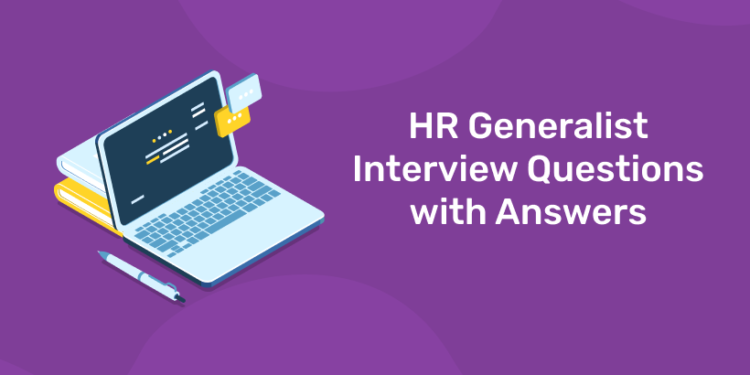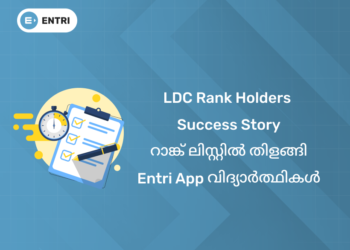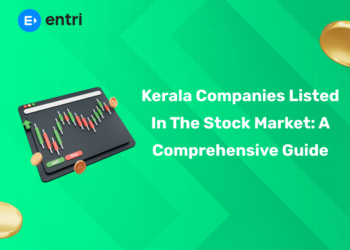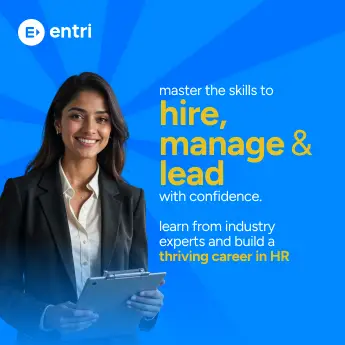Table of Contents
Introduction
HR Generalist is one of the most important roles in any organization. HR Generalists do a lot of things such as recruitment, employee relations, benefits administration and labor laws. Since this is an important role, preparing for an HR Generalist interview is a necessity. In this blog we are going to discuss some common HR Generalist interview questions, answer and tips to demonstrate your skills and experience. Also if you want to enhance your HR knowledge and skills, take an HR Management Course in Kerala by Entri which will provide you with the right tools to excel in your HR career.
HR Generalist Interview Questions
1. What is the role of an HR Generalist?
Answer:
An HR Generalist is responsible for many human resources activities in an organization. The activities typically involve recruitment and selection, employee onboarding, performance management, employee relations, benefits administration, compliance with labor laws, and training and development. The HR Generalist serves as a bridge between the management and the employees, ensuring that HR policies align with organizational objectives while having a good workplace culture.
2. How do you carry out recruitment and selection?
Answer:
I would begin with the proper job requirements for my recruitment and selection process. I would work with the hiring managers in creating an accurate job description, including key competencies. Multiple sources of recruitment are used, including job boards, social media, and networking. Then, resumes are screened, initial interviews are conducted, and evaluated based on their skills and fit into the organization’s culture. Lastly, I carry out the interview process with the concerned stakeholders to ensure a smooth hiring process.
3. How do you carry out employee onboarding?
Answer:
I think that a formal onboarding process is the best way to retain employees and get them productive. I will create a comprehensive onboarding plan that involves orientation, company policy training, and introductions to team members. I will give the new employees resources and tools to be successful. I will also check in with them regularly during the first few months to correct any problems and get feedback on the onboarding process.
4. Can you describe your performance management experience?
Answer:
My previous positions were characterized by a performance management approach that includes setting goals, constant feedback, and regular performance evaluations. I will train the manager on effective appraisals, giving constructive criticisms, and more importantly, link individual goals with organizational objectives and create a sense of responsibility as well as personal development.
5. How do you comply with labor laws?
Answer:
I keep abreast of changes in regulations and best practices to ensure compliance with labor laws. I also maintain accurate records and documentation to demonstrate compliance during audits.
6. What methods of employee engagement do you apply?
Answer:
Employee engagement is the root to organizational success. Various strategies I adopt comprise holding regular employee surveys so as to take an estimation of their satisfactions and feedback. Promotion of recognition programs enhances employees’ celebration of other colleagues’ achievement and maintains openness in communication. Another crucial activity related to engagement includes provisions for career opportunities and maintenance of a friendly working atmosphere.
7. How do you handle conflict resolution in the workplace?
Answer:
Conflict resolution should be approached diplomatically. I listen to all parties concerned first to understand their standpoints. I initiate a discussion that would encourage open communication and bring out common grounds. I always refer to the company policies guiding the resolution to ensure fairness in the outcome. After the resolution, I follow up to ensure relationships are improved and no issues persist.
8. How would you describe your HR software experience?
Answer:
I have utilized a number of HR software applications, such as recruitment ATS, HRIS to manage employee data, and performance management. My skills in these applications empower me to automate most HR processes, provide accurate records, and analyze human resource metrics well. I believe that there is always room for improvement with respect to technology skills that are positively applied to HR functions.
9. Describe a training program you designed.
Answer:
I noticed the lack of some leadership skills for mid-level managers in my former organization. The leadership training was designed, therefore, with different workshops, mentorship, and real-life practices that would enhance and improve on various critical skills that include communication, conflict resolution, and decision-making skills. There is a good number of participant feed-back that they were highly motivated, and consequently, the impact on the overall team dynamics was improved as well as productivity.
10. How do you handle employee benefits administration?
Answer:
Employee benefits administration management is complex and requires many steps. It includes yearly benefits audits so that the offering is aligned with the needs of employees and with market trends. I communicate clear options for employees to make better choices and ensure that I keep abreast of all the applicable regulations. Furthermore, I help employees resolve issues or answer any questions they have about their benefits.
11. What experience do you have with labor relations?
Answer:
In my previous positions, I have managed labor relations by maintaining open communication between management and employees. I have experience in negotiating labor agreements and mediating disputes.
12. How do you ensure diversity and inclusion in the workplace?
Answer:
I support diversity and inclusion by implementing initiatives that encourage diverse hiring practices and work to create an inclusive workplace culture. This includes bias training for hiring managers and employee resource groups, in addition to cultural events, whereby I track diversity metrics to measure the effectiveness of our initiatives and move towards improvement in areas identified by our metrics.
13. Tell me about a time you had to implement change in an organization.
Answer:
I once had to change a performance management system for a former company. First, I sought the inputs of the employees and management on what they needed and what they were concerned about. Then, I created a proper communication plan to ensure that everyone knew what was going on during the process. As a part of follow-up on the new system after its implementation, I offered some training sessions so that every employee would feel comfortable using it. This resulted in higher goal congruence as well as improved employee satisfaction about the review process.
14. How would you deal with the underperformers?
Answer:
I address underperformance with a support and development approach. This begins with having a private conversation with the employee to understand what is causing the problem. Then, together we identify specific performance goals and work out an improvement plan with clear expectations and timelines. I also provide regular feedback and resources for skill development and follow up on progress.
15. What are your methods of employee feedback?
Answer:
Anonymous surveys, one-on-one meetings, and suggestion boxes help me get employee feedback. During team meetings, I open up our discussion, making it a culture where people feel safe to express their thoughts. Once the feedback is collected, I analyze the data and communicate the results to the team, including the actionable steps we will take as a result of their input.
16. How do you plan and prioritize tasks to manage your time?
Answer:
I prioritize based on urgency and importance. I have tools such as to-do lists and project management software to track my responsibilities. I break big projects down into smaller, more manageable ones with deadlines on each. By continuously reviewing my progress, I update priorities if need be to hit deadlines without losing any quality.
17. What is your approach to developing HR policies?
Answer:
My strategy of writing HR policies is very research-based and team-based. First of all, I review the present policies and spot the lacunae or problems that need an improvement. For this purpose, I take all kinds of input from management to employees to be sure that those policies are up to the mark according to organizational requirements and requirements of employees as well. And, in this regard, my policies are very much aligned to legal compliance as well as everyone in the company understands it.
18. How do you handle employee grievances?
Answer:
My approach to managing employee grievances is always empathetic and systematic. I listen to the employee and then document all details. I conduct a thorough investigation into the matter while speaking with people in concerned roles to get different perspectives on it. I work quickly to resolve the grievance and communicate it to the employee; if further action is required, I make sure that takes place too.
19. How would you describe your experience regarding workforce planning?
Answer:
In workforce planning, I look at the current staffing levels, employee skills, and future needs of the organization. I discuss gaps and expected hiring needs with department heads to ensure that it is aligned with business objectives. I also analyze employee performance and potential to create succession plans. This way, I align workforce planning with strategic goals to prepare the organization for future challenges.
20. What are your strategies for maintaining workplace morale?
Answer:
I promote workforce morale through positive and inclusive culture. I create teamwork, recognition, and social activities to improve relationships among employees and open communication; this helps the employee to feel that the company succeeds. I also provide chances for career progression, which enhances a sense of belonging and investment in the company’s success.
21. How do you implement training and development programs?
Answer:
Before training and developing the employees, I examine all the gaps regarding skills that an organization possesses or lacks. Collaborating with different department heads on specific needs is necessary before working on creating curricula based on those requirements. I engage a variety of approaches to the various learning types-including workshops, e-learning, and mentorship programs-aiming at effectiveness through periodic review and feedbacks.
22. Can you describe a successful recruitment campaign you led?
Answer:
Led a hiring effort of a software development firm searching for programmers that made a significant push to their social media presences and main technology-based bulletin boards; designed engaging job advertisements that spoke about the healthy culture and room to grow at the company; set up and activated successful referral initiatives that improved the internal referrals rate, shortened time-to-hire by 40%, and expanded the pool of qualified applicants to the same number of candidates.
23. How will you handle the sensitive information coming to HR?
Answer:
Handling sensitive information requires that utmost confidentiality is practiced. I keep all the records of the employees in a secured place, accessible only to those who are allowed to. I also conduct periodic training sessions on data privacy law and the confidential nature of it. Furthermore, I avoid public discussion or any other unauthorized party about sensitive information.
24. What is your experience with employee retention strategies?
Answer:
I have developed and implemented several employee retention strategies, including competitive compensation packages, career development opportunities, and employee recognition programs. I conduct exit interviews to understand why employees leave and use that feedback to improve our work environment. By fostering a culture of continuous improvement and support, we have significantly reduced turnover rates.
25. Can you explain your understanding of employee relations?
Answer:
Employee relationships refer to maintaining effective and healthy relationships between the institution and its employees. I expect to deal with most concerns and solve the existing conflicts plus maintain an encouragement-friendly working environment. I believe in open communication and being transparent as it fosters trust and encourages employees to speak out on their issues. Good employee relationships translate into enhanced morale and productivity.
26. How do you evaluate training effectiveness?
Answer:
I measure effectiveness through pre- and post-training assessments, participant feedback surveys, and changes in workplace performance. From the evaluation, I‘ll be able to determine if indeed the training did meet its purposes and where modifications are needed. Continuous evaluation also enables me to update training programs to better focus on organizational goals.
27. How do you approach succession planning?
Answer:
I ensure that succession planning starts with the identification of key roles in the organization and then determines the skills and potential of present employees. In collaboration with the managers, we identify high potentials and develop a plan for developing them. Such plans include providing mentorship, training, and opportunities for growth. This means preparing employees to take on more leadership roles at the right time, ensuring easy transition when one of the other positions becomes available.
28. Let me recall a situation of when I had to face a tough employee.
Answer:
I asked for a private meeting to listen to their issues and frustrations. Through active listening and validation, I was able to find root causes of such behavior. Together, we set a plan on how to improve their concerns. This led to good communication and better attitude at work.
29. How do you conduct performance reviews?
Answer:
I have prepared the necessary tools and templates for the performance review in front of managers and trained them to give good feedback and goals set. A two-way communication I encourage within the review session for employees’ input and ambitions. After review, I continue with follow-through, ensuring improvement plans are followed through and on the radar of tracking.
30. What’s your experience about compensation analysis?
Answer:
I have analyzed compensation so that our pay structures are always competitive and fair. This includes industry benchmarking, analyzing our internal salary data, and finding areas of discrepancy. I work with finance and management on compensation plans that will ensure budgetary and organizational goals while also meeting labor laws and codes.
31. How do you handle layoffs or terminations?
Answer:
Handling layoffs or terminations requires sensitivity and professionalism. I make sure the process follows legal requirements, and that the affected employees have been treated with respect. I prepare clear communication stating reasons for the decision and outline support resources, including career counseling and job placement assistance. I also ensure that other employees are informed and supported during transition.
32. How can you facilitate a positive workplace culture?
Answer:
A positive workplace culture can be promoted through open communication, celebrating differences, and teamwork. I organize team-building activities, employee recognition programs, and feedback sessions. I also create an inclusive environment where everybody feels valued and empowered to contribute his or her ideas. We cultivate a healthy culture by actively promoting company values and encouraging employee involvement.
33. What is your practice when it comes to managing distributed employees?
Respond:
Managing distant employees requires clear communication, set expectations and clear communication in the workplace, so I communicate through various instruments and ensure we check in periodically. I challenge the remote staff to be honest about their journey and challenges faced. I will also encourage an atmosphere of trust and accountability whereby they are flexible enough to give room for life and work simultaneously while being efficient.
34. How do you determine training needs?
Response
I carry out a training needs assessment through analysis of performance metrics, employee feedback, and consultations with department heads. I conduct surveys and focus groups to find the gap in skill levels and areas in which the employees prefer to receive training. Through these results, I come up with training programs targeted to the identified needs, thereby relating to organizational objectives. In doing this, employees have every chance of performing successfully.
35. Describe experience with employee well-being programs?
Response
My experiences include conceptualizing and creating employee well-being programs focused on encouraging both physical and mental well-being. The programs might involve a set of fitness-related challenges, such as workshops dedicated to mental well-being and relevant work-life balancing resources. Collaborate with various external wellness professionals for an end-to-end spectrum of support provision and enable every employee to better their health conditions by maximizing productivity while on the job.
36. How do you ensure effective communication between HR and other departments?
Answer:
Good communication between HR and other departments is important for organizational success. I have regular meetings with department heads on HR-related matters and also solicit feedback. I create open channels of communication, such as newsletters or intranet updates, to inform everyone about what the HR team is doing. This will make sure that the HR department can support the needs of all departments through strong relationships and collaboration.
37. What experience do you have with HR metrics and analytics?
Answer:
I have used HR metrics and analytics to inform data-driven decision-making. I monitor key performance indicators, including turnover rates, employee engagement scores, and recruitment metrics. Analyzing this data helps identify trends, measure the effectiveness of HR initiatives, and inform strategic planning. I present findings to management to support recommendations for improving HR practices.
38. How do you approach talent acquisition?
Answer:
My talents acquisition approach is through creating a positive candidate experience from start to finish. I ensure building of a strong employer brand and leveraging different sourcing strategies to attract diverse candidates. I make sure that our selection process is fair and transparent and the same as our values. Through effective communication and engagement, I want to create an easy experience that also reflects organizational culture.
39. Discuss a time you faced an HR ethical dilemma
Answer:
A time when I faced an ethical dilemma was when one employee complained that another colleague was harassing them. I acted by following reporting procedures to handle the case fairly and discreetly. I had open communication with the parties without breaching confidentiality. There was a need for a fair probe, but at the same time, not at the cost of the rights of the people involved. But, there in my head was always the interest of all those concerned employees.
40. What will HR look like in the future?
Answer:
The future of HR will be HR analytics in driving decision-making and process improvements, while flexibility at work through either full-time or part-time remote work, flexible work locations, or flexible hours continues to be the new norm. It also means new approaches to employee engagement and performance management. HR will challenge inclusion and adaptability as organizations strive to change and adjust.
Become an HR Expert – Enroll in Our HR Management Course Today!
Unlock the secrets to effective Human Resource Management with our expert-led course! Learn recruitment, employee relations, performance management, and more to build a thriving workplace. Start your journey toward a successful HR career today!
Know MoreConclusion
If you want to upgrade your HR knowledge and skills, join HR Management Course in Kerala by Entri. This course will provide you with basic HR skills like recruitment, employee relations, compliance and performance management. You will get training from industry experts and practical experience through assignments and sessions.
For more details about the course, fees and syllabus visit HR Management Course in Kerala. Boost your HR career and get ahead in the HR world!
Become an HR Expert – Enroll in Our HR Management Course Today!
Unlock the secrets to effective Human Resource Management with our expert-led course! Learn recruitment, employee relations, performance management, and more to build a thriving workplace. Start your journey toward a successful HR career today!
Know MoreFrequently Asked Questions
What qualifications do I need to become an HR Generalist?
To become an HR Generalist, a bachelor’s degree in human resources, business administration, or a related field is typically required. Some positions may also prefer candidates with an HR certification, such as SHRM-CP or PHR, which demonstrates a commitment to the profession and a strong understanding of HR principles. Additionally, relevant experience in HR, even in internships or entry-level roles, can be beneficial. Strong communication, problem-solving, and organizational skills are also essential for success in this role.
What are the key responsibilities of an HR Generalist?
The key responsibilities of an HR Generalist include managing the recruitment process, conducting interviews, onboarding new employees, administering benefits, maintaining employee records, ensuring compliance with labor laws, and handling employee relations issues. HR Generalists also develop training programs, facilitate performance evaluations, and assist in creating and implementing HR policies. Their role is to support both the employees and the organization in achieving their goals.
How do HR Generalists handle employee conflicts?
HR Generalists handle employee conflicts by first ensuring that all parties involved feel heard. They often utilize active listening techniques to understand the perspectives of each employee. After gathering information, HR Generalists may mediate discussions between the conflicting parties to facilitate resolution, focusing on finding common ground. They may also refer to company policies to guide the resolution process and follow up afterward to ensure that relationships improve and no further conflicts arise.
What skills are essential for an HR Generalist?
Essential skills for an HR Generalist include strong communication skills, both verbal and written, to effectively convey information and facilitate discussions. Interpersonal skills are crucial for building relationships with employees and stakeholders. Organizational skills are needed to manage multiple tasks efficiently. Additionally, problem-solving skills help address workplace challenges creatively. Familiarity with HR software and analytical thinking for interpreting data are also important for modern HR functions.
How do HR Generalists stay updated with labor laws and HR trends?
HR Generalists stay updated with labor laws and HR trends through various methods. They may attend workshops, seminars, and conferences focused on HR topics. Subscribing to HR journals, newsletters, and following reputable HR blogs and online forums also provide valuable information. Networking with other HR professionals through associations and online communities allows HR Generalists to share insights and best practices. Continuous education through webinars and courses is another effective way to remain informed.
What is the significance of performance management?
Performance management is significant because it helps organizations align individual employee goals with overall business objectives. It provides a structured process for evaluating employee performance, giving feedback, and identifying areas for development. Effective performance management fosters employee engagement and motivation, leading to higher productivity and retention rates. Additionally, it helps in recognizing high performers and addressing underperformance, ultimately contributing to the organization’s success.
How do HR Generalists ensure compliance with workplace regulations?
HR Generalists ensure compliance with workplace regulations by regularly reviewing and updating company policies to align with current laws. They conduct training sessions for employees and management on compliance issues, such as anti-discrimination laws, workplace safety, and employee rights. Maintaining accurate records and documentation is crucial for demonstrating compliance during audits. HR Generalists also stay informed about changes in labor laws and regulations to proactively address any necessary adjustments in policies or practices.
What is the recruitment process like for an HR Generalist?
The recruitment process for an HR Generalist typically involves several stages. First, they conduct a job analysis to understand the requirements of the role. Next, they source candidates through job boards, social media, and networking. After screening resumes, HR Generalists conduct initial interviews to assess qualifications. They then coordinate interviews with hiring managers and may facilitate skill assessments. Once a candidate is selected, HR Generalists extend job offers and oversee the onboarding process to ensure a smooth transition into the organization.
How do HR Generalists measure employee engagement?
HR Generalists measure employee engagement through surveys, feedback mechanisms, and performance metrics. Employee engagement surveys can assess job satisfaction, motivation, and overall morale. HR Generalists may also conduct focus groups or one-on-one interviews to gather qualitative insights. Monitoring turnover rates, attendance, and productivity levels provides quantitative data on engagement. Based on these insights, HR Generalists can develop strategies to enhance engagement and address any areas of concern.
Can an HR Generalist work remotely, and how do they manage their tasks?
Yes, an HR Generalist can work remotely, especially in organizations that have embraced flexible working arrangements. To manage their tasks effectively, they utilize HR software and communication tools to stay connected with employees and management. Setting clear goals and priorities helps in managing time effectively. Regular check-ins and virtual meetings maintain engagement and ensure that HR functions run smoothly. By leveraging technology, HR Generalists can efficiently manage recruitment, employee relations, and compliance tasks from remote locations.









